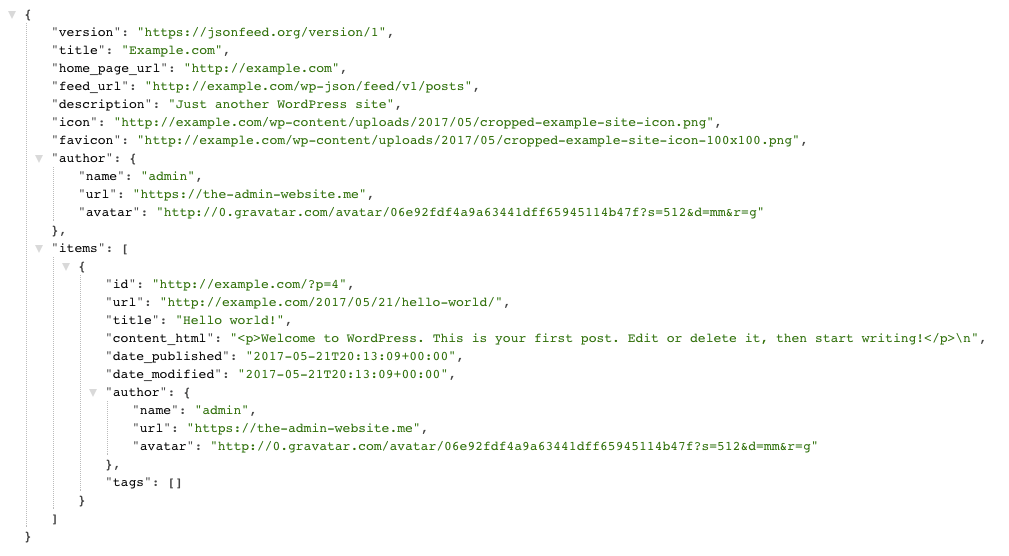Description
Implements JSON feeds following the official JSON feed specification by using the WordPress REST API. By default, only a JSON feed for regular posts is added. This can be easily customized to also provide JSON feeds for e.g. certain custom post types.
- Adds JSON feeds following the official version 1.1 spec.
- Adds a JSON feed for posts to the REST API by default (e.g. at
/wp-json/feed/v1/posts). - Allows adding JSON feeds for other post types by using a
show_json_feedargument when registering the post type. - Places a link tag to the current feed inside the HTML head tag.
- Maintains backward compatibility with the previous JSON feed version 1 spec.
- Contains extensive filters to modify the feed responses as necessary.
Installation
- Upload the entire
wp-api-json-feedfolder to the/wp-content/plugins/directory or download it through the WordPress backend. - Activate the plugin through the ‘Plugins’ menu in WordPress.
Administration
Once the plugin is activated, it will work out of the box and provide a JSON feed for posts. If you want to provide JSON feeds for further post types, you need to specify an additional argument show_json_feed when registering the post type, and set it to a boolean true. You may also specify a json_feed_base argument being a string identifier that should be used in the feed URL. If no string identifier is provided, the post type slug will be used.
FAQ
-
How can I add a feed for my custom post type?
-
To provide a JSON feed for your custom post type, you need to specify an additional argument
show_json_feedwhen registering the post type, and set it to a booleantrue. You may optionally specify ajson_feed_baseargument being a string identifier that should be used in the feed URL. If no string identifier is provided, the post type slug will be used.Here is an example, supporting a JSON feed for a custom post type “article” and setting its feed base to “articles” so that the feed will appear at
{restURL}/feed/v1/articles.<?php add_filter( 'register_post_type_args', function ( $args, $post_type ) { if ( 'article' === $post_type ) { $args['show_json_feed'] = true; $args['json_feed_base'] = 'articles'; } return $args; }, 10, 2 ); -
Why does the JSON feed contain fields which are not part of the schema?
-
Since the JSON feed schema is always future compatible, by default the plugin preserves backward compatibility with older JSON feed readers by maintaining deprecated fields such as
author. You can skip this backward compatibility behavior by using thewp_api_json_feed_skip_backward_compatibilityfilter and returningtrue. -
Where should I submit my support request?
-
For regular support requests, please use the www.ads-software.com support forums. If you have a technical issue with the plugin where you already have more insight on how to fix it, you can also open an issue on GitHub instead.
-
How can I contribute to the plugin?
-
If you have ideas to improve the plugin or to solve a bug, feel free to raise an issue or submit a pull request in the GitHub repository for the plugin. Please stick to the contributing guidelines.
You can also contribute to the plugin by translating it. Simply visit translate.www.ads-software.com to get started.
Reviews
There are no reviews for this plugin.
Contributors & Developers
“WP-API JSON Feed” is open source software. The following people have contributed to this plugin.
ContributorsTranslate “WP-API JSON Feed” into your language.
Interested in development?
Browse the code, check out the SVN repository, or subscribe to the development log by RSS.
Changelog
1.1.0
- Added: Add support for the JSON feed 1.1 spec.
- Added: Introduce filter
wp_api_json_feed_skip_backward_compatibilityto optionally skip JSON feed fields included for backward compatibility with JSON feed 1.0 spec. - Enhanced: Include a
<link>tag for the most relevant JSON feed based on the current content, in addition to the general posts JSON feed. - Enhanced: Include a
user_commentfield in the JSON feeds. - Tweaked: Bump the minimum required WordPress and PHP versions.
- Tweaked: Use modern test infrastructure including revised PHPUnit tests, and GitHub Actions to ensure long-term stability.
- Fixed: Remove unnecessary call to
load_plugin_textdomain().
1.0.0
- First stable version

